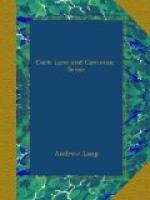Among the many hypotheses as to the origin of religion, that which we may call the evolutionary, or anthropological, is most congenial to modern habits of thought. The old belief in a sudden, miraculous revelation is commonly rejected, though, in one sense, religion was none the less ‘revealed,’ even if man was obliged to work his way to the conception of deity by degrees. To attain that conception was the necessary result of man’s reflection on the sum of his relations to the universe. The attainment, however, of the monotheistic idea is not now generally regarded as immediate and instinctive. A slow advance, a prolonged evolution was required, whether we accept Mr. Max Muller’s theory of ‘the sense of the Infinite,’ or whether we prefer the anthropological hypothesis. The latter scheme, with various modifications, is the scheme of Epicurus, Lucretius, Hume, Mr. Tylor, and Mr. Herbert Spencer. Man half consciously transferred his implicit sense that he was a living and rational being to nature in general, and recognised that earth, sky, wind, clouds, trees, the lower animals, and so on, were persons like himself, persons perhaps more powerful and awful than himself. This transference of personality can scarcely be called the result of a conscious process of reasoning. Man might recognise personality everywhere, without much more thought or argument than a kitten exerts when it takes a cork or a ball for a living playmate. But consciousness must have reached a more explicit stage, when man began to ask himself what a person is, what life is, and when he arrived at the conclusion that life is a spirit. To advance from that conclusion; to explain all life as the manifestation of indwelling spirits; then to withdraw the conception of life and personality from inanimate things, to select from among spirits One more powerful than the rest, to recognise that One as disembodied, as superior, then as supreme, then as unique, and so to attain the monotheistic conception, has been, according to the evolutionary hypothesis, the tendency of human thought.
Unluckily we cannot study the process in its course of action. Perhaps there is no savage race so lowly endowed, that it does not possess, in addition to a world of ‘spirits,’ something that answers to the conception of God. Whether that is so, or not, is a question of evidence. We have often been told that this or the other people ‘has no religious ideas at all’. But later we hear that they do possess a belief in spirits, and very often better information proves that, in one stage or other of advance or degradation, the theistic conception of a Maker and Judge of the world is also present. Meanwhile even civilised and monotheistic peoples also admit the existence of a world of spirits of the dead, of ‘demons’ (as in Platonism), of saints (as in Catholicism), of devils, of angels, or of subordinate deities. Thus the elements of religion are universally distributed




